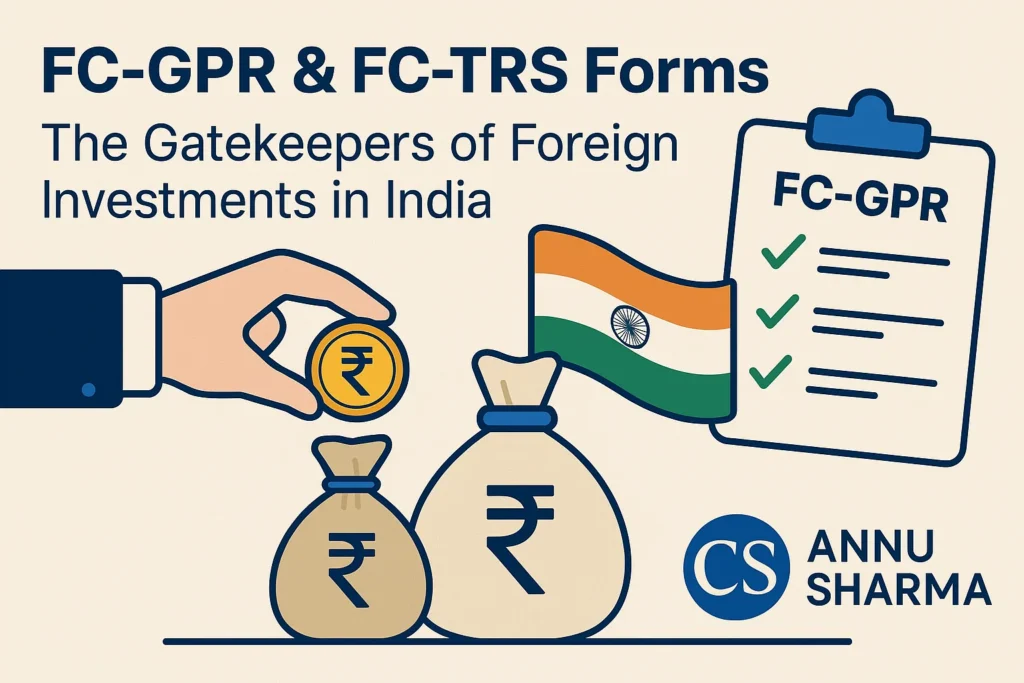FC-GPR & FC-TRS Forms: FC-GPR (Foreign Currency-Gross Provisional Return) and FC-TRS (Foreign Currency-Transfer of Shares) are compliance forms required under FEMA regulations to report foreign investments to the Reserve Bank of India (RBI). FC-GPR is filed when a company issues shares to a foreign investor, and must be submitted within 30 days of share allotment. FC-TRS is filed when shares are transferred between a resident and a non-resident, with a 60-day filing deadline from the date of payment. These forms ensure transparency and proper tracking of foreign exchange transactions. Company Secretaries play a key role in preparing, verifying, and filing these forms on the FIRMS portal.
Imagine India as a giant machine, and foreign investors as the fuel that powers some of its most important parts. When this fuel—foreign money—comes in or goes out of our companies, the Indian government wants to keep a close eye on it. Why? To make sure everything’s clean, legal, and beneficial for the economy.
Table of Contents
That’s where FC-GPR and FC-TRS forms come in. These aren’t just random paperwork—they are crucial tools used by the Reserve Bank of India (RBI) to track and regulate foreign investments in India.
Let’s break them down one by one—what they are, why they matter, and how Company Secretaries play a key role in managing them.
🟢 First Things First – Why Were These Forms FC-GPR & FC-TRS Forms Implemented?
The Indian government introduced these forms to:
- Monitor how much foreign money is flowing in or out.
- Ensure companies follow Foreign Direct Investment (FDI) rules under FEMA (Foreign Exchange Management Act).
- Prevent illegal transactions or round-tripping of black money.
- Maintain accurate records of foreign ownership in Indian companies.
Without these forms, the RBI would be blind to who is investing in India, how much they are investing, or whether they’re even allowed to do so!

📄 1. FC-GPR – When a Foreign Investor Buys Fresh Shares in an Indian Company
🔍 What is FC-GPR?
FC-GPR stands for Foreign Currency – Gross Provisional Return.
This form is filed when a foreign investor puts money directly into an Indian company and is allotted equity shares, preference shares, or debentures in return.
Think of it like this:
A US-based investor wants to invest ₹5 crore in your Indian company. You issue new shares to them. Now, you must report this to RBI through Form FC-GPR.
📌 Purpose of FC-GPR:
To inform the RBI that:
- A foreign investor has invested in your company.
- You have issued fresh shares in exchange.
- All regulatory norms (pricing, sector caps, etc.) were followed.
🧾 Checklist of Required Documents (FC-GPR):
| Document | Purpose |
|---|---|
| Board Resolution | Proves that the company officially approved the share allotment. |
| FIRC | Confirms that the money was actually received from abroad. |
| KYC of Investor | To verify the identity of the foreign investor. |
| Valuation Certificate | Confirms the share price is fair and as per guidelines. |
| Share Certificate Copy | Proof that shares were issued to the investor. |
| Shareholder Agreement | Shows the terms agreed upon. |
| MoA (Capital Clause) | Verifies the company’s authorized capital. |
| Declarations & Undertakings | Mandatory as per RBI. |
🧑💼 Company Secretary’s Role in FC-GPR Filing:
A CS wears many hats during FC-GPR filing:
- Regulatory Expert – Ensures the company follows FDI rules (sectoral limits, pricing, etc.).
- Document Manager – Collects and checks all documents mentioned above.
- Filing Agent – Files the FC-GPR form on RBI’s FIRMS Portal within 30 days of allotment.
- Bank Liaison – Coordinates with the Authorized Dealer (AD) Bank to get approval.
In short, a CS is the bridge between the company, the investor, and the RBI.
🔁 2. FC-TRS – When Shares are Transferred Between a Resident and a Non-Resident
🔍 What is FC-TRS?
FC-TRS stands for Foreign Currency – Transfer of Shares.
This form is used when shares are being sold or bought between a resident (Indian) and a non-resident (foreign person/entity).
Here’s a simple example:
An Indian promoter sells shares of his company to a US-based firm. Now, the company must report this transfer to RBI through Form FC-TRS.
📌 Purpose of FC-TRS:
To notify the RBI that:
- There’s been a share transfer involving a foreign investor.
- Money has moved from one party to another.
- The pricing and documentation comply with FEMA rules.
🧾 Checklist of Required Documents (FC-TRS):
| Document | Purpose |
|---|---|
| Share Purchase Agreement | Legal proof of transfer. |
| FIRC / Bank Advice | Confirms receipt/payment of money. |
| KYC of Buyer/Seller | Identity verification. |
| Valuation Certificate | Ensures the share price is fair and legal. |
| Share Certificates | Shows the shares being transferred. |
| PAN Card (Resident Party) | Mandatory for Indian residents. |
| Declaration by CS | Certifies the transaction followed all rules. |
| Consent Letters | Shows mutual agreement of transfer. |
| Updated Shareholding Pattern | For transparency before and after the deal. |
🧑💼 Company Secretary’s Role in FC-TRS Filing:
Here’s what a CS handles:
- Review Share Deal – Ensures the share price is as per the valuation rules.
- Collect Documents – Gathers all proofs (payment, agreements, identity).
- File FC-TRS – Submits the form on the FIRMS portal within 60 days of receipt/payment.
- Coordinate with AD Bank – Follows up for processing and RBI acknowledgment.
🔍 Why These Forms Matter – Not Just Compliance, But Smart Business
FC-GPR and FC-TRS may look like just forms, but they are:
- Legal proof of investment or transfer.
- Critical for due diligence during funding rounds, IPOs, or audits.
- Essential for good governance, especially when dealing with foreign investors.
Skipping or delaying these filings can attract penalties, scrutiny from RBI, and loss of credibility.
🧾 Summary Table: FC-GPR & FC-TRS Forms
| Feature | FC-GPR | FC-TRS |
|---|---|---|
| Used When | New shares are issued to a foreign investor | Existing shares are transferred between a resident and non-resident |
| Filing Deadline | Within 30 days of allotment | Within 60 days of payment/receipt |
| Filed On | RBI FIRMS Portal | RBI FIRMS Portal |
| Verified By | AD Bank | AD Bank |
| CS Role | Ensures FDI compliance, files form, coordinates with bank | Reviews transfer, files form, certifies compliance |
10 frequently asked questions (FAQs) on FC-GPR & FC-TRS Forms, designed in simple, practical language:
✅ 1. What is the full form of FC-GPR and FC-TRS?
- FC-GPR: Foreign Currency – Gross Provisional Return
- FC-TRS: Foreign Currency – Transfer of Shares
These are forms filed on the RBI’s FIRMS portal to report foreign investments in Indian companies.
✅ 2. When do we file FC-GPR?
You file FC-GPR when a foreign investor puts money into your company and you issue new equity shares, preference shares, or convertible debentures in return.
Deadline: Within 30 days from the date of share allotment.
✅ 3. When is FC-TRS required?
You file FC-TRS when shares are transferred between a resident and a non-resident, either way—resident to foreigner or foreigner to resident.
Deadline: Within 60 days from the receipt or remittance of money.
✅ 4. What happens if I don’t file these forms on time?
Late filing can result in:
- Penalty under FEMA, which could be up to 3 times the amount involved.
- Issues during audits, due diligence, or future funding rounds.
- Trouble with RBI or the Authorized Dealer (AD) Bank.
✅ 5. Where are FC-GPR and FC-TRS forms filed?
Both forms are filed online through the FIRMS portal of the Reserve Bank of India (RBI).
Link: https://firms.rbi.org.in
✅ 6. Who verifies these forms after filing?
The Authorized Dealer (AD) Bank—usually the company’s banker—verifies the form before RBI processes it. The CS often coordinates with the bank for approval.
✅ 7. Is valuation mandatory for both FC-GPR and FC-TRS?
Yes. A valuation certificate by a Chartered Accountant or SEBI-registered Merchant Banker is mandatory for both forms to confirm that the shares are priced as per RBI norms.
✅ 8. Can a Company Secretary file these forms?
Yes. A Company Secretary (CS) is usually responsible for preparing, verifying, and filing FC-GPR and FC-TRS. CS also ensures compliance with all FEMA and FDI rules.
✅ 9. What is an FIRC and why is it needed?
FIRC stands for Foreign Inward Remittance Certificate. It is issued by the bank to confirm that foreign money has been received. It’s a must-have for both FC-GPR and FC-TRS filings.
✅ 10. Do we need to file FC-TRS for share transfers between two foreign investors?
No. FC-TRS is only filed when at least one party is a resident Indian. Transfers between two foreign entities do not require FC-TRS but may still need to be reported based on specific RBI guidelines.

